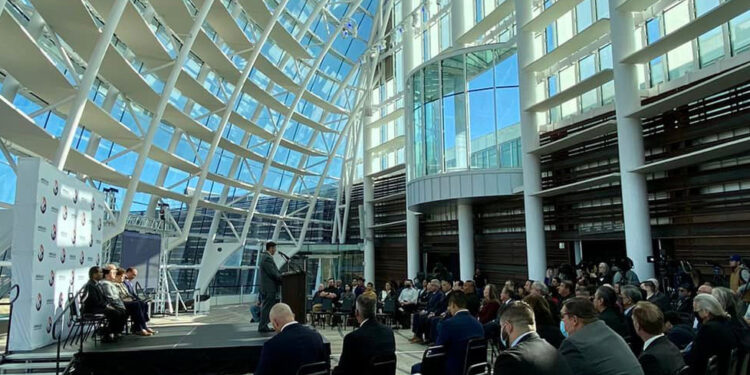OKLAHOMA CITY, Oklahoma – The Oklahoma Tribal Finance Consortium released the findings of the tribal nations’ 2019 economic impact on the state during a press conference held at the First Americans Museum on March 23.
“Tribes are an economic driver as well as a constant and reliable partner,” President of the Oklahoma Tribal Finance Consortium and Director of Tribal Services, REDW, and LLC Victor Flores said.
The study reports that in 2019, tribes had a more than $15.6 billion impact on the state while directly employing more than 54,000 people and supported a total of 113,442 jobs to tribal citizens and non-tribal citizens; accounting for more than $5.4 million in wages and benefits to the Oklahoma workforce.
“Unlike corporations that move based on economic conditions, our tribes are here to stay,” Flores said. “Oklahoma is home and we will continue to reinvest in our communities through job creation, critical service delivery and infrastructure development.”
This new report shows a $2.6 billion increase from the last study done over the tribal economic impact in 2017.
In 2017, the total economic impact made by Oklahoma’s 39 tribes was $12.9 billion. Direct employment was about 52,000 jobs.
Kyle Dean, Associate Professor of Economics and Director for the Center for Native American and Urban Studies at Oklahoma City University, analyzed data from 16 tribal nations based in OK and prepared the study.
“Audited data for some tribes is available later than others,” Dean said. “Therefore, we chose to use 2019 as the study year to ensure that we could obtain audited data from participants to ensure data consistency.”
He said from the aggregate estimated profile he was able to estimate the direct contribution and create inputs into the economic model from which the impacts were estimated.
Wednesday’s report solely includes the economic activity generated or administered by tribes and the Indian Health Service (IHS), according to Dean.
“They exclude the direct contribution of many related Native American entities and the direct contribution of tribal citizens and many self-identified native Americans.”
The tribal health system reportedly and collectively paid over $322 million in Medicaid expenses, saving the state over $86 million in 2019.
With over 45 facilities across the state, the tribes serve communities by providing care at most locations to both Natives and non-Natives.
“In 2019 alone, there were 3.5 million patient visits at tribal health facilities in Oklahoma,” Executive Director, Southern Plains Tribal Health Board Nicholas Barton said.
Gaming compacts between the state and tribes, a percentage of gaming funds is submitted and the state sends the first $250,000 to the Oklahoma Department of Mental Health and Substance Abuse Services leaving 88 percent earmarked for Oklahoma public education.
Chairman of Oklahoma Indian Gaming Association Matthew L. Morgan said the tribes’ impact on the state is immeasurably positive. The gaming industry alone employs more than 75,000 across OK.
“We build roads and hospitals, invest in our public schools and universities and create programs to serve those who need assistance,” Morgan said. “We are proud of our past, excited about things happening right now, and determined to leave the next generation an industry and an Oklahoma that they can take pride in.”
Tribes have paid more than $1.8 billion in exclusivity fees since 2006, and more than $1.5 billion earmarked for education. In 2019, an additional 84 million was paid by tribes to support schools, municipalities and other community initiatives.
Principal Chief David Hill said the Muscogee Nation helped provide over 45,000 immunizations to Oklahomans not excluding non-tribal members for no cost helping the state save in health care expenditures.
Muscogee Nation held the Miss USA Pageant at the River Spirit Casino, bringing economic impact in tourism for the state and tribe, according to Hill.
The Nation will hold its annual festival this year after two years of cancellations; and according to Hill, it is projected to attract around 40,000 tourists over a three-day period.
Another way the Nation has boosted Oklahoma’s economy recently, is with the filming of Reservation Dogs that helped generate local, tribal, and state economy.
In agribusiness, the Nation purchased a ranch and built a meat processing plant that opened in November, adding to the economy in several ways current and future.
“We are still here,” Hill said. “We aren’t going anywhere.”
The Oklahoma Tribal Finance Consortium’s mission is to advance tribal economics and strengthen tribal finance within the state of Oklahoma.





